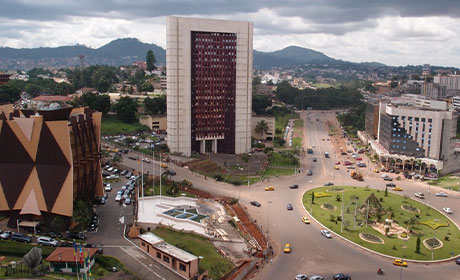Producing actionable information for urban decision-making is crucial in order to take early action for urban resilience, yet policies and practices to reduce the risks of climate change are slow to materialize in many cities, especially in highly vulnerable areas of the world. So, how can scientists bring their knowledge to bear on policy and implementation to shape the development trajectories of cities?

Yaoundé, capital of Cameroon. Photo: Ville Miettinen / Flickr.
McPhearson and colleagues, in a recent article in Nature, argue that for the Habitat III New Urban Agenda to be effective there is a need for the global research community of biophysical and social scientists to assess development trajectories and help direct progress. But the article suggests that in the drafting process of the New Urban Agenda science was mostly absent.
SEI is collaborating in a project that addresses this question directly. It focuses on cities in southern Africa, where there is rapid urban growth, and infrastructure struggles to deliver public services, and where climate risks and vulnerabilities remain acute.
The Future Resilience for African Cities and Lands (FRACTAL) project is supporting the creation of more climate resilient and equitable development pathways for cities in Africa, particularly for water, energy and food security.
Working within individual disciplines is often not an adequate approach in the face of these complex problems. FRACTAL has been designed to be transdisciplinary, to integrate the knowledge of academics, practitioners and local people across the public sector, civil society, business and industry.
The term climate services is increasingly used to describe the integration of different sources of knowledge, including climate science, to support decision-making. Climate services is an emerging field that holds promise for dealing with the impacts of the unprecedented pace of urbanization that is taking place around the world under multiple environmental pressures.
But working in a transdisciplinary way introduces new challenges for research, policy-making and practice. For example, scientists can find it difficulty to give up control over the overall research process and the ownership of knowledge. A large amount of time, energy and funding is also often required, and there is a need to build trust so that partnerships can flourish on an equal basis. Furthermore, there is need to develop a shared language to bridge disciplinary concepts and conventions. This has to be tailored for every context and adapted depending on whether you, for example, talk to a disaster risk advisor or a climate adaptation specialist. Finally there is much uncertainty in doing new transdisciplinary work, so flexibility is vital.
FRACTAL is taking on these challenges by convening Learning Labs and embedding researchers in the cities being studied. Learning Labs periodically gather a broad range of knowledge-holders and decision-makers in each city to work together on developing a deeper shared understanding of a critical issue linked to climate that cities face. In the case of Lusaka, water security and resilience in peri-urban, informal settlements are critical questions.
Embedded researchers are recruited through a partnership between the local university and local government in each city to work towards effective communication between scientists, policy-makers, officials and practitioners, and to collect and share relevant data, information, questions and findings with all project partners and stakeholders: they work at the heart of the science-policy-practice interface.
Deeper forms of collaboration and knowledge co-creation such as those being developed in the FRACTAL project can help scientists play a bigger role in shaping sustainable urban development. FRACTAL is a major part of SEI’s Climate Services Initiative, which aims to produce, tailor, interpret and transfer of high-quality climate information to support planning and decision-making for adaptation and disaster resilience.
Design and development by Soapbox.